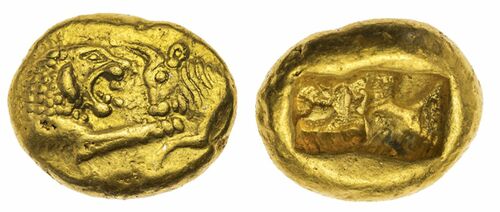
Auction: 23007 - Ancient Coins Including the 'Kyrios' Collection of Greek Coins and featuring the 'Ostorius' Collection of Roman Gold
Lot: 19
The 'Kyrios' Collection | Kingdom of Lydia, Kroisos (560-546 BC), AV Stater, Sardis, foreparts of a lion and bull facing off, rev. two incuse square punches, side-by-side, 8.06g (Traité 1401-1403; Carradice, Pl. XI, 8; Berk 4; Kurth –; SNG Ashmolean 761; SNG von Aulock 2876; SNG Kayhan 1023; SNG Lockett 2984; Boston MFA 2077 = Warren 1287; Sunrise 15), light rub to highest points, otherwise lustrous and well-centred, on a rich gold fabric, about extremely fine, an icon from the Dawn of Numismatics
PROVENANCE
Spink 207, 1-2 December 2010, lot 1252 - 'extremely fine' - £6,800
Spink America, Ancient Coins Auction, 3 May 1995, lot 234
Kroisos, revealing all his wealth to the Athenian statesman and lawgiver Solon, asked him who he thought was the happiest man in the world. Much to his chagrin however, Solon named someone else. When pressed again Solon did not even rank Kroisos in his top three. Solon's scorn for his wealth clearly annoyed Kroisos who subsequently dismissed him "thinking him a great fool". All Solon had pointed out was that his wealth did not mean a lot given the mutability of fate and the fickleness of the gods - something that was to prove remarkably true a few years later when Kroisos' kingdom had fallen to the unstoppable expansion of Cyrus.
Kroisos' name has always been synonymous with extreme wealth. Not only taking advantage of his father's wealth and bounteous tax revenues, Kroisos proceeded to expand his kingdom even capturing lucrative prizes such as Ephesus. Much of his wealth seems to have derived from the extensive natural resources of his territory not least the river Pactolus, the legendary river in which King Midas washed in to lose his powers. Electrum was abundant in the alluvial deposits of the silt in this river, Midas' legacy.
With vast quantities of electrum so readily available, it is perhaps unsurprising that Lydia became the first place to produce a coinage. Herodotus, in his sketch of Lydian nomoi (customs) could claim "They were the first men whom we know who coined and used gold and silver currency; and they were the first to sell by retail". Herodotus was not entirely correct, not least because the original coins were first in electrum as they were unable to separate the silver and the gold. Striking most likely begun under Kroisos' father Alyattes, and by Kroisos' reign Staters and their fractions were produced in gold and silver. XRF analysis of the surface of this Stater reads at an impressive 97.3% gold with the silver content reduced to a mere impurity of a little over 1%. Bullion had long been used a convenient medium of exchange - however, it was the crucial involvement of the state and the stamping of bullion which made this currency truly innovative.
Subject to 20% VAT on Buyer’s Premium. For more information please view Terms and Conditions for Buyers.
Sold for
£14,000
Starting price
£5000




